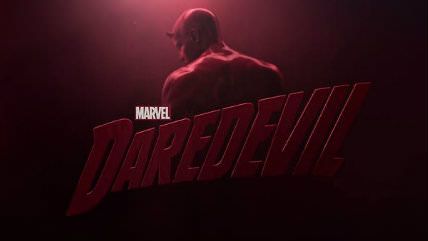How Netflix's New Daredevil Series Makes Torture Into a Virtue
The superhero show celebrates the violent interrogations inflicted by its main character.

The Daredevil series on Netflix is about how one man, alone and with right in his heart, can change a city for the better using only one weapon: torture.
Politically the Daredevil series, based on the long-running Marvel comic about a blind superhero whose alter-ego is a criminal defense lawyer named Matt Murdock, is a casual mess—a melange of half-digested, not especially coherent liberal and conservative talking points thrown together almost at random.
The series' working-class Hispanics living in rent-controlled apartments under threat from evil developers is a basic lefty meme. The all-consuming corruption of government institutions, from politicians to police, is borrowed from libertarian or right-wing distrust of government. The Kingpin—a powerful crime boss and one of Daredevil's arch enemies—is a villain to liberals because he's super-rich. He's a villain to conservatives because he's a dreamy and hypocritical help-the-poor idealist. In short, there's a reason for people of every political persuasion to be flattered or irritated, as long as no one thinks about it too hard.
But amidst the ideological confusion, the one consistent value is torture. To unravel the Kingpin's web of corruption, Daredevil resorts again and again to threats and violent interrogation.
Most of this involves straightforward thuggish brutality. Daredevil (Charlie Cox) asks a question, then hits or kicks the poor schmo who isn't talking. Sometimes the torture is more elaborate, with Daredevil using his ninja fighting skills to break limbs or snap bones. And at least one incident involves elaborate, prepared interrogation techniques. In what is probably a crib from the seminal Batman comic The Dark Knight Returns, which was written by influential comics scribe Frank Miller shortly after he wrote a similarly character-defining run on Daredevil, our hero drags his victim up onto the roof, ties him up, and then takes advice from his nurse friend Claire (Rosario Dawson) on how to use a blade to inflict unbearable pain.
On the TV series 24, torture is necessitated by the ticking clock. Harsh measures are underwritten by the certainty and imminence of terrorist apocalypse. Daredevil doesn't even bother with such shilly-shallying justifications.
The show spends a lot of moral energy worrying about whether or not Daredevil/Matt Murdock will or won't commit murder. But violence short of actually killing someone is barely even greeted with a shrug. Claire, the nurse, has no compunction about using her medical knowledge in the service of torture, and the show doesn't even seem to realize that anyone might have such reservations. Daredevil doesn't torture any women—only the bad guys do that—but he cheerfully beats a 73-year-old man, a junkie who's barely able to stand, and various men who pose no immediate threat to the hero or anyone else. There's no time-bomb scenario—torture is just what heroes do. Daredevil even tortures one guy in order to find a new tailor.
Superheroes strong-arming villains goes back to early Superman and the beginning of the genre. But it's unusually central in the Netflix series, where it's arguably Daredevil's main power. His super-enhanced senses allow him to detect increased heartbeats and therefore tell when people are lying. Coupled with judicious use of torture, Daredevil becomes a human lie-detector; an avatar of truth burning through the layers of shadows and falsehoods in which the Kingpin conceals his machinations.
You could argue, perhaps, that Daredevil's torture has little relevance to debates about government torture. Daredevil, after all, is not a federal agent nor a cop.
But even if Daredevil is not an agent of the state, his use of torture still serves (and arguably even validates) official power. The Kingpin's final downfall is engineered when Daredevil terrorizes a witness into turning state's evidence. The guy agrees after Daredevil threatens him—and then the hero hits him another few times, just to emphasize the righteous motivating force of unaccountable brutality. The episode then moves on to a collage of FBI agents rounding up the bad guys.
The hero tortures and that torture races through the legal system, righting wrongs. Information gained through torture is not a poisoned fruit; it's justice itself.
In superhero narratives, violence outside the law, unconstrained by institutional checks and balances, is not compromised or wrong. On the contrary, vigilantism is actually more virtuous, precisely because it exceeds the normal workings of the legal system, and can inflict or exact punishment in a way that the courts and police cannot. Daredevil is, in that sense, a perfect, clarifying fulfillment of its genre. The hero is a hero because he hurts the bad guys. If Dick Cheney himself were underneath Daredevil's mask, he couldn't have argued the rationale for torture any more clearly.


Show Comments (197)